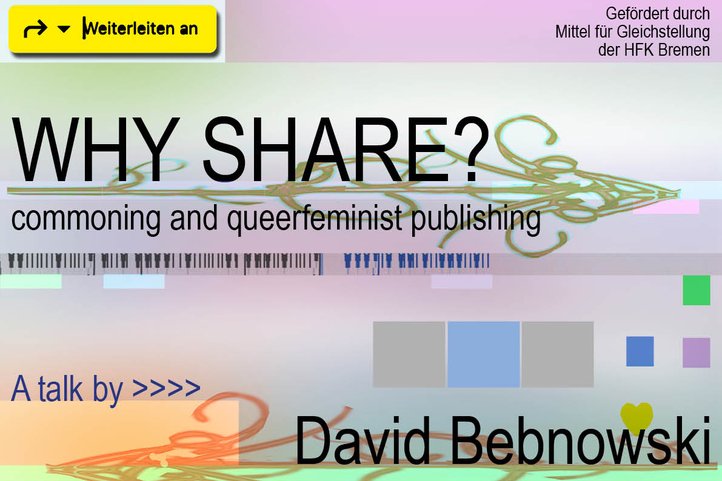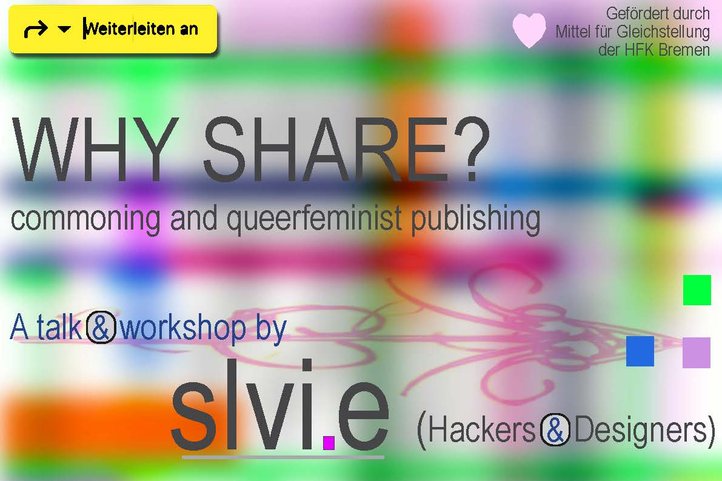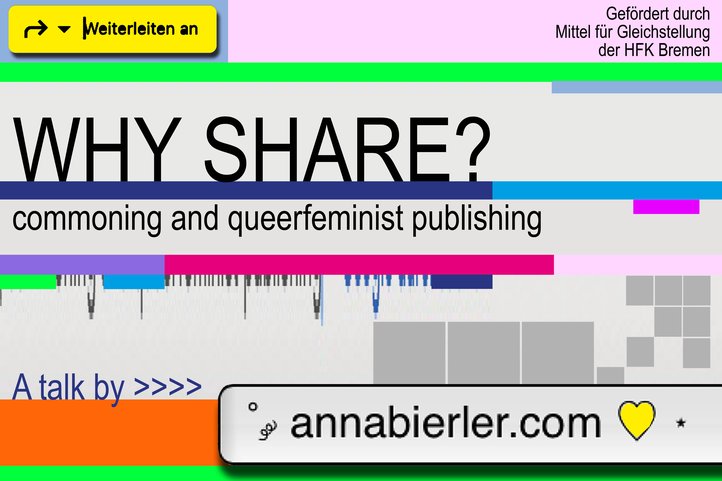
Prof. Tania Prill
- Study programme Integriertes Design
- Email t.prill@hfk-bremen.de
- Phone +49 421 9595-1228
Vita
Tania Prill ist in Hamburg aufgewachsen und lebt in Zürich. Studium der Visuellen Kommunikation an der Hochschule für Künste Bremen, der HFG Zürich (ZHdK). Executive Master „Design | Art + Innovation", Hochschule für Gestaltung und Kunst Basel. Ihr 2001 in Zürich gegründetes Studio Prill & Vieceli – seit 2011 Prill Vieceli Cremers wurde mit zahlreichen internationalen Auszeichnungen gewürdigt u.a. mit dem renommierten Jan-Tschichold-Preis und dem Designpreis Deutschland. 2018 Gründung des Studios Tania Prill. Neben Auftragsarbeiten realisiert sie Künstlerbücher wie 336 pages 336 books und MONEY und ist als Herausgeberin Unter dem Radar, Underground- und Selbstpublikationen 1965–1975 tätig.
Seit 1997 unterrichtet Tania Prill Typografie, visuelle Kommunikation und Editorial Design an Hochschulen im In- und Ausland. Von 2004–2010 Professorin für Kommunikationsdesign an der Hochschule für Gestaltung Karlsruhe. 2010 wurde Tania Prill als Professorin für Typografie an die Hochschule für Künste Bremen berufen.
An der HfK koordiniert Tania Prill das AIP–Archive of Independent Publishing, dass aus der Sammlung von Jan-Frederik Bandel und dem Projekt Unter dem Radar. Underground- und Selbstpublikationen 1965–1975,hervorgegangen ist. Bei Spector Books ist 2017 das gleichnamige Buch erschienen (s.o.), weitere Publikationen des AIP werden ebenfalls dort veröffentlicht. Das AIP ist eine Sammlung deutscher und internationaler Underground- und Selbstpublikationen, die seit 2018 an der HfK Bremen beheimatet ist. Der Bestand von Hunderten von Heften, Broschüren und Büchern, die größtenteils aus dem Zeitraum 1965–1975 stammen, steht der Nutzung durch Forschende, Studierende und Interessierte offen, richtet sich aber vor allem an Design- und Typografiestudierende. Das Kooperationsprojekt wir publizieren der Hochschule für Künste Bern und der HfK Bremen, an dem u. a. Master-Studierende beider Hochschulen beteiligt sind, knüpft an das Projekt Unter dem Radar an.
Zusammen mit Prof. Andrea Rauschenbusch ist Tania Prill verantwortlich für den Druckpool der HfK.
- Auszeichnungen (Auswahl)
- Most Beautiful Swiss Books, für das Buch: "The Legend of Barbara Rubin", Konzept und Gestaltung: Franziska Bauer (MA-Studentin School of Visual Combinations & Tania Prill, Spector Books)
- Grand Prix, Type Directors Club, Tokyo, 2018 for "Under the Radar, Underground Zines and Self-Publications 1965–1975"
- Swiss Design Award, Bundesamt für Kultur Schweiz: 2014, 2008, 2007
- 6th China International Poster Biennial, Gold Award (Cultural Poster) for «Martin Parr–Souvenir», 2013
- Die schönsten Schweizer Bücher, 2013–2010, 2007–2004, 2002
- Gold in der Sparte Kultur, 6th China International Poster Biennial, 2013
- Gold in der Sparte Kultur, Swiss Poster Award, 2012
- Die schönsten deutschen Bücher, Stiftung Buchkunst Leipzig, 2012
- Designpreis der Bundesrepublik Deutschland, Silber,2011
- ADC Award – Bronze, 89th annual awards, New York, 2010
- Die schönsten Bücher aus aller Welt, Stiftung Buchkunst, Bronzemedaille, 2008
- red dot award, communication design, 2007
- Jan Tschichold Preis, Bundesamt für Kultur Schweiz, 2007
- Die 100 besten Plakate Deutschland, Österreich, Schweiz, diverse Auszeichnungen
- Vorträge (Auswahl)
- The Archive of Independent Publishing AIP, Fig Festival, Liège, Belgium, 2019
- READERS OF ALL COUNTRIES: PUBLISH!, Tania Prill & Andreas Vogel (Head of the Design and Fine Arts Department of the Bern University of the Arts HKB) at the Faculty of Fine Arts, MSU Baroda and Pro Helvetia – Swiss Arts Council, New Delhi, 2018
- Print Out: Archiving and Cultural Practices of Alternative Publishing Ventures, School of Arts and Communication, University of Hyderabad, 2018
- Tokyo Type Directors Club, Grand Prix,DNP hall, Tokyo, 2018
- New York Art Book Fair, MoMA PS1, New York, 2017
- Designers Open, Leipzig, 2017
- PrintRoom's Pick from the New York Art Book Fair, PrintRoom, Rotterdam, 2017
- TypoTag. Typografie und Museum, Museum für Angewandte Kunst, MAK, Frankfurt, 2017
- Conférence de graphisme, Centre Culturel Suisse, CSS Paris», 2017
- International Design School & Bulthaup Galerie, St. Petersburg, 2016
- Design Week, Otis College of Art and Design, L.A., 2015
- Biennale de l'édition, Lyon, 2015
- HEAR, Strasbourg, 2015
- Most Beautiful Swiss Books, Helmhaus Zürich, 2013
- Interviews
- Inter Graphic View, Bremen, Juni 2018
- TM Research Archive, Zürich, November 2011
- Publikationen (Auswahl)
- "The Legend of Barbara Rubin" Franzika Bauer (MA-Studentin School of Visual Combinations) & Tania Prill, Spector Books, 2019
- "Unter dem Radar, Underground- und Selbstpublikationen 1965–1975" Jan-Frederik Bandel, Annette Gilbert, Tania Prill (Hg.), Spector Books, 2016
- "Geräusche, Ritornelle für eine Kunstgeschichte des Klangs" Mit Beiträgen von Michael Glasmeier.Tania Prill und Andrea Sick (Hg.), Textem Verlag, 2016
- "Typografie als künstlerisches Ereignis" Michael Glasmeier und Tania Prill (Hg.), Textem Verlag, 2016
- "MONEY" Tania Prill, Alberto Vieceli, Sebastian Cremers, Edition Patrick Frey, 2014
- "336 pages, 336 books" Tania Prill, Alberto Vieceli, Sebastian Cremers, every edition, 2013
- Eigengrau, International Poster and Design Festival, Chaumont, 2014
- Tokyo TDC Annual Awards, Tokyo, 2014
- eye, The international review of Graphic Design, Magazine, No. 81, 2011
- Graphic #12, Seoul, Korea, 2011
- Tokyo Type Directors Club, Annual Awards 2010
- Double Pages, Editions B42, 2010
- idpure, The Swiss Magazine of Graphic Design and Visual Creation, No. 13, 2007, No. 18, 2009, No. 21, 2010
- Typography, Unity with New Life, bt'09 Bejing Typography 2009
- Graphic Design: A User's Manual, Laurence King Publishing Ltd, 2009
- eye, The international review of Graphic Design, No. 72, 2009
- Typografische Monatsblätter, Basel, 2007
- Spielwitz und Klarheit, Schweizer Architektur, Grafik und Design 1950–2006, Lars Müller Publishers, 2006
- Altitude, Contemporary Swiss Graphic Design,gestalten Berlin, 2006
- IDEA 316 Special Issue: The Condition of Graphic Design, Japan, 2006
- entwürfe, Nr. 46, Zeitschrift für Literatur, Schweiz, 2006
- Look at this, Contemporary Broschures, Catalogues & Documents, Laurence King Publishing, 2006
- Beauty and the Book, Niggli Verlag, 2004
- Jury (Auswahl)
- 2017 Schönste Schweizer Bücher, Bundesamt für Kultur, Schweiz
- 2016 Schönste Schweizer Bücher, Bundesamt für Kultur, Schweiz
- 2016 Swiss Photo Award – the.selection, Photobastei Schweiz
- 2013 Weltformat Luzern, Präsidentin des Plakatwettbewerbs
- 2012–2015 Swiss Poster Award, APG, Schweiz
- 2009 Corporate-Design Wettbewerb, der Deutschen Gesellschaft für Designtheorie und -forschung e.V. (dgtf)
- 2006 Die 100 besten Plakate, Deutschland, Österreich, Schweiz, 2005
- Auszeichnungen Studierender (Auswahl)
- "The Legend of Barbara Rubin" Schönste Schweizer Bücher, Bundesamt für Kultur, Franzika Bauer, MA-Studio School of Visual Combinations, Spector Books, 2019
- International Poster Biennale Warsaw, Plakat: HfK Hochschultage, Sarah Fricke, Lisa Petersen
- Hochschulpreis 1. Platz, Integriertes Design, Der Skrupel, Jan Charzinski, MA-Studio Sprache und Kommunikation, 2017
- Plakatwettbewerb Anfachen, Feng Zhao, MA-Studio School of Visual Combinations, 2017
- Hochschulpreis 3. Platz, Integriertes Design, Fresh Prints, Gruppenprojekt, 2016
- Weltformat Plakatfestival, Internationalerstudentischer Wettbewerb zum Thema "Original / Kopie": aus 1000 studentischen Einsendungen wurden 20 Plakate gedruckt und im öffentlichen Raum in Luzern ausgestellt. 4 dieser 20 Plakate waren HfK-Plakate aus meinem Seminar: ABC des Plakats / pictura und subscriptio von Elaine Döpkens (2), Lorraine Liedert (1) und Saskia van der Meer (1), 2016
- ADC New York – Gold Award, ArtDirectorsClub New York, 2012 / Projekt: Der Schöne Mann – Das Magazin
- Hochschulpreis 2012, HfK Bremen, Projekt: Der Schöne Mann – Das Magazin, Team Gestaltung: Jefferson Andrade, Josefa Brun, Bianca Holtschke, Matthias Keller, Yamuna Peters, Art Direction: Prof. Tania Prill
- output award / Veröffentlichung, 2011 / Projekt: Think a box, Ellen Grace Albers, Katharina Krug
- output award / Veröffentlichung, 2011 / Projekt: Rare Books, Franziska Sander
Current courses
- take A walk Michel de Certeau, französischer Kulturphilosoph, hat in seinem Werk verschiedene Denkfiguren entwickelt, die unser unser Alltagsleben in den Blick nehmen. Hierzu gehören verschiedene Techniken, wie zum Beispiel das Gehen. Im Sinne seines „walking, wandering, window shopping“ werden wir Schrift und typografische Spuren in und um Bremen gemeinsam entdecken und eine Sammlung von Schrift und Typografie anlegen. ---
- take A walk Michel de Certeau, französischer Kulturphilosoph, hat in seinem Werk verschiedene Denkfiguren entwickelt, die unser unser Alltagsleben in den Blick nehmen. Hierzu gehören verschiedene Techniken, wie zum Beispiel das Gehen. Im Sinne seines „walking, wandering, window shopping“ werden wir Schrift und typografische Spuren in und um Bremen gemeinsam entdecken und eine Sammlung von Schrift und Typografie anlegen. --- Michel de Certeau, French cultural philosopher, has developed various figures of thought in his work that focus on our everyday lives. These include various techniques, such as walking. In the spirit of his “walking, wandering, window shopping”, we will discover writing and typographic traces in and around Bremen together and create a collection of writing and typography.
- Schwarzer Markt für rote Bücher: Bremen (Block A) Bücher verlangen Taten. Heinrich Mann, 1919* Initiiert von Annette Gilbert sind Kolleg:innen verschiedener Universitäten (Berlin, Marburg, Augsburg und Bremen) im Projekt "Schwarzer Markt für rote Bücher" im Wintersemester 25_26 eingeladen, sich mit «‘alternativen’ Formen der Literatur- und Buchproduktion: dem Raub- bzw. Nachdruck, der ohne Wissen oder Erlaubins der Autor:innen bzw. Verlage erfolgt.», zu befassen. «Einen neuen Höhepunkt erlebte der Raubdruck mit der studentischen und linken Bewegung Ende der 1960er Jahre. Im Zentrum stand der Kampf gegen das Urheberrecht, das als überkommenes Relikt einer bürgerlichen Epoche galt, wie es sich exemplarisch im Namen des Raubdruckverlags „Zerschlagt das bürgerliche Copyright“ zeigt. Der Idee des Privateigentums setzten die Raubdrucker mit ihren ‚sozialisierten Drucken‘ die Idee eines Kollektiveigentums entgegen. (…) Aber über all das ist noch viel zu wenig bekannt, was nicht zuletzt an der Kriminalisierung von Raubdrucken liegt. Der Börsenverein des deutschen Buchhandels setzte im Auftrag der etablierten Verlage, denen angeblich Gewinne in Millionenhöhe entgingen, Detektive auf die Szene an. Später stieg das BKA in die strafrechtliche Verfolgung ein – wegen des (haltlosen) Verdachts auf Unterstützung der RAF. Man findet daher Raubdrucke heute eher in privaten Bücherregalen oder Privatarchiven als in Bibliotheken, denen der Erwerb verboten war.»* In Bremen sichten wir ein Raubdrucke an der Staats- und Universitätsbibliothek Bremen, begeben uns auf eine Recherche nach Raub-Drucker:innen, Verleger:innen, Buchhändler:innen, Bibliothekar:innen, Anwält:innen, Käufer:innen, Leser:innen um mit Zeitzeug:innen zu sprechen. Eine für Juni 2026 geplante Ausstellung in der SuUB wird zeigen, welche Zugänge ihr persönlich zu dem gesichteten Material habt und welche Relevanz ihr dieser Form des Publishing im Hier und Jetzt zuschreibt. War in der 60er Jahren das gedruckte Wort oftmals Hauptgegenstand der Verbreitung von Raubdrucken, ist heute das Wissen vermeintlich nur einen Klick oder einen Prompt entfernt. Was können wir aus der damaligen Bewegung inklusive ihrer Protagonist:innen heute zum Beispiel im Hinblick auf Wissensmonopole, Gatekeeping, Plattformkapitalismus und Data-Mining lernen. Ein Besuch der einmaligen Sammlung von über 3.000 linken, studentischen Raubdrucken der 1968er, die Albrecht Goetz von Olenhusen im Laufe seines Lebens zusammengetragen hat und die Annette Gilbert vor zwei Jahren an die DNB Leipzig vermitteln konnte, so dass sie nun der Öffentlichkeit zur Verfügung steht, ist im November möglich, ebenso wie die Teilnahme an der Tagung: https://www.dnb.de/DE/Kulturell/Veranstaltungskalender/Einzel/20251127Raubdrucktagung_event.html *aus. Handbuch der Raubdrucke 2, Theorie und Klassenkampf. Eine Bibliographie. Götz von Olenhusen / Christa Gnirss --- [i]Books require action.*[/i] Heinrich Mann, 1919 Initiated by Annette Gilbert, colleagues from various universities (Berlin, Marburg, Augsburg and Bremen) are invited to take part in the project “Schwarzer Markt für rote Bücher” in the winter term 25_26 to deal with “‘alternative’ forms of literature and book production: the pirating or reprinting that takes place without the knowledge or permission of the authors or publishers”. (...) Pirated printing reached a new high point with the student and left-wing movement at the end of the 1960s. The focus was on the fight against copyright, which was seen as an outdated relic of a bourgeois era, as exemplified by the name of the pirated printing publishing house “Zerschlagt das bürgerliche Copyright”. With their ‘socialized prints’, the pirate printers countered the idea of private ownership with the idea of collective ownership. (...) But far too little is known about all this, not least because of the criminalization of pirated printing. The German Publishers and Booksellers Association put detectives on the scene on behalf of the established publishers, who were allegedly losing millions in profits. Later, the Federal Criminal Police Office (BKA) became involved in criminal prosecution – on the (unfounded) suspicion of supporting the RAF. Today, pirated prints are therefore more likely to be found on private bookshelves or in private archives than in libraries, which were prohibited from acquiring them. "* In Bremen, we will look through an archive of pirated prints at the Bremen State and University Library, go on a search for printers, publishers, booksellers, librarians, lawyers, pub vendors, buyers and readers to talk to contemporary witnesses and visit the Archive for Social Movements. Our research may result in an exhibition planned by the Freundeskreis der Staats- und Universitätsbibliothek Bremen for spring 2026 or in individual independent projects with a typographic focus. What access do you personally have to this material and what relevance do you attach to this form of publishing in the here and now? Whereas in the 1960s the printed word was often the main object of the dissemination of pirated prints, today knowledge is supposedly just a click or a prompt away. What can we learn today from the movement of that time, including its protagonists, for example with regard to knowledge monopolies, gatekeeping, platform capitalism and data mining? A visit to the unique collection of over 3,000 left-wing, student pirated prints from 1968, which Albrecht Goetz von Olenhusen collected over the course of his life and which Annette Gilbert was able to arrange for the DNB Leipzig two years ago so that it is now available to the public, would be possible towards the end of the semester. *from: Handbuch der Raubdrucke 2, Theorie und Klassenkampf. Eine Bibliographie. Götz von Olenhusen / Gnirß
- Schwarzer Markt für rote Bücher: Bremen (Block B) Bücher verlangen Taten. Heinrich Mann, 1919* Initiiert von Annette Gilbert sind Kolleg:innen verschiedener Universitäten (Berlin, Marburg, Augsburg und Bremen) im Projekt "Schwarzer Markt für rote Bücher" im Wintersemester 25_26 eingeladen, sich mit «‘alternativen’ Formen der Literatur- und Buchproduktion: dem Raub- bzw. Nachdruck, der ohne Wissen oder Erlaubins der Autor:innen bzw. Verlage erfolgt.», zu befassen. «Einen neuen Höhepunkt erlebte der Raubdruck mit der studentischen und linken Bewegung Ende der 1960er Jahre. Im Zentrum stand der Kampf gegen das Urheberrecht, das als überkommenes Relikt einer bürgerlichen Epoche galt, wie es sich exemplarisch im Namen des Raubdruckverlags „Zerschlagt das bürgerliche Copyright“ zeigt. Der Idee des Privateigentums setzten die Raubdrucker mit ihren ‚sozialisierten Drucken‘ die Idee eines Kollektiveigentums entgegen. (…) Aber über all das ist noch viel zu wenig bekannt, was nicht zuletzt an der Kriminalisierung von Raubdrucken liegt. Der Börsenverein des deutschen Buchhandels setzte im Auftrag der etablierten Verlage, denen angeblich Gewinne in Millionenhöhe entgingen, Detektive auf die Szene an. Später stieg das BKA in die strafrechtliche Verfolgung ein – wegen des (haltlosen) Verdachts auf Unterstützung der RAF. Man findet daher Raubdrucke heute eher in privaten Bücherregalen oder Privatarchiven als in Bibliotheken, denen der Erwerb verboten war.»* In Bremen sichten wir ein Raubdrucke an der Staats- und Universitätsbibliothek Bremen, begeben uns auf eine Recherche nach Raub-Drucker:innen, Verleger:innen, Buchhändler:innen, Bibliothekar:innen, Anwält:innen, Käufer:innen, Leser:innen um mit Zeitzeug:innen zu sprechen. Eine für Juni 2026 geplante Ausstellung in der SuUB wird zeigen, welche Zugänge ihr persönlich zu dem gesichteten Material habt und welche Relevanz ihr dieser Form des Publishing im Hier und Jetzt zuschreibt. War in der 60er Jahren das gedruckte Wort oftmals Hauptgegenstand der Verbreitung von Raubdrucken, ist heute das Wissen vermeintlich nur einen Klick oder einen Prompt entfernt. Was können wir aus der damaligen Bewegung inklusive ihrer Protagonist:innen heute zum Beispiel im Hinblick auf Wissensmonopole, Gatekeeping, Plattformkapitalismus und Data-Mining lernen. Ein Besuch der einmaligen Sammlung von über 3.000 linken, studentischen Raubdrucken der 1968er, die Albrecht Goetz von Olenhusen im Laufe seines Lebens zusammengetragen hat und die Annette Gilbert vor zwei Jahren an die DNB Leipzig vermitteln konnte, so dass sie nun der Öffentlichkeit zur Verfügung steht, ist im November möglich, ebenso wie die Teilnahme an der Tagung: https://www.dnb.de/DE/Kulturell/Veranstaltungskalender/Einzel/20251127Raubdrucktagung_event.html *aus. Handbuch der Raubdrucke 2, Theorie und Klassenkampf. Eine Bibliographie. Götz von Olenhusen / Christa Gnirss --- [i]Books require action.[/i] Heinrich Mann, 1919* Initiated by Annette Gilbert, colleagues from various universities (Berlin, Marburg, Augsburg and Bremen) are invited to take part in the project “Schwarzer Markt für rote Bücher” in the winter term 25_26 to deal with “‘alternative’ forms of literature and book production: the pirating or reprinting that takes place without the knowledge or permission of the authors or publishers”. (...) Pirated printing reached a new high point with the student and left-wing movement at the end of the 1960s. The focus was on the fight against copyright, which was seen as an outdated relic of a bourgeois era, as exemplified by the name of the pirated printing publishing house “Zerschlagt das bürgerliche Copyright”. With their ‘socialized prints’, the pirate printers countered the idea of private ownership with the idea of collective ownership. (...) But far too little is known about all this, not least because of the criminalization of pirated printing. The German Publishers and Booksellers Association put detectives on the scene on behalf of the established publishers, who were allegedly losing millions in profits. Later, the Federal Criminal Police Office (BKA) became involved in criminal prosecution – on the (unfounded) suspicion of supporting the RAF. Today, pirated prints are therefore more likely to be found on private bookshelves or in private archives than in libraries, which were prohibited from acquiring them. "* In Bremen, we will look through an archive of pirated prints at the Bremen State and University Library, go on a search for printers, publishers, booksellers, librarians, lawyers, pub vendors, buyers and readers to talk to contemporary witnesses and visit the Archive for Social Movements. Our research may result in an exhibition planned by the Freundeskreis der Staats- und Universitätsbibliothek Bremen for spring 2026 or in individual independent projects with a typographic focus. What access do you personally have to this material and what relevance do you attach to this form of publishing in the here and now? Whereas in the 1960s the printed word was often the main object of the dissemination of pirated prints, today knowledge is supposedly just a click or a prompt away. What can we learn today from the movement of that time, including its protagonists, for example with regard to knowledge monopolies, gatekeeping, platform capitalism and data mining? A visit to the unique collection of over 3,000 left-wing, student pirated prints from 1968, which Albrecht Goetz von Olenhusen collected over the course of his life and which Annette Gilbert was able to arrange for the DNB Leipzig two years ago so that it is now available to the public, would be possible towards the end of the semester. *from: Handbuch der Raubdrucke 2, Theorie und Klassenkampf. Eine Bibliographie. Götz von Olenhusen / Gnirß ** from the event description by Annette Gilbert
- Mentoring bei Tania Prill Das Mentoring Angebot bietet euch eine lückenlose und individuelle Beratung während des Studienverlaufs. Das Modul findet als One-One Treffen oder als Gruppentreffen statt. Das Mentoring Programm unterstützt euch individuell in eurem Studienverlauf bei Fragen der Organisation und Struktur und gibt Tipps zu Lerntechniken, beispielsweise bei Prüfungsschwierigkeiten oder Prüfungsängsten. Es stellt eure Bedürfnisse, Erfahrungen, Fähigkeiten, aktuelle und zukünftige Herausforderungen, Wünsche und Probleme in Bezug auf das Studium in den Vordergrund. Ich betreue euch bei der Planung, Durchführung und der Nachbereitung eures Auslands- oder Praxissemesters. Außerdem bietet ich in diesem Programm Unterstützung bei der – an der HfK sehr wichtigen – Selbstorganisation, sowie Orientierung bei der zunehmenden Digitalisierung des Studiums. Das Programm befähigt euch eure Ziele klar zu setzen. In den individuellen Besprechungen werden keine inhaltlichen Themen in Bezug auf die Module besprochen, sondern der Verlauf eures Studiums reflektiert und geplant. Ich berate euch in allen individuellen Studienangelegenheiten und unterstütze beim Gesamtverlauf des Studiums. Die durch euch geführte Dokumentation des Mentoring hilft euch den Überblick über den Studienverlauf zu behalten. Das in der Dokumentation geführte Protokoll hilft Positives, wie auch Schwierigkeiten im Studium zu lokalisieren und garantiert einen lückenlosen Austausch mit uns Mentor:innen. Im Mentoring-Programm wird u.a. die Modulwahl besprochen, der Umgang mit der Selbstlernzeit, Probleme mit CP‘s, Ideen für Tätigkeiten nach dem Studium und an professionelle Anlaufstellen weitergeleitet. Ihr sollt befähigt werden, unter Berücksichtigung der Regelstudienzeit, das Bestmögliche aus dem Studium an der HfK herauszuholen. Ich werde euch über mehrere Semester in diesem Programm begleiten. ---
- Betreuung Individuelles Mastervorhaben (erstes Semester) bei Tania Prill
- Betreuung Individuelles Mastervorhaben (zweites Semester) bei Tania Prill [i]Bücher verlangen Taten.[/i] Heinrich Mann, 1919* Initiiert von Annette Gilbert, sind Kolleg:innen verschiedener Universitäten (Berlin, Marburg, Augsburg und Bremen) im Projekt „Schwarzer Markt für rote Bücher“ im Wintersemester 25_26 eingeladen, sich mit „‘alternativen’ Formen der Literatur- und Buchproduktion: dem Raub- bzw. Nachdruck, der ohne Wissen oder Erlaubins der Autor:innen bzw. Verlage erfolgt.“, zu befassen. „Einen neuen Höhepunkt erlebte der Raubdruck mit der studentischen und linken Bewegung Ende der 1960er Jahre. Im Zentrum stand der Kampf gegen das Urheberrecht, das als überkommenes Relikt einer bürgerlichen Epoche galt, wie es sich exemplarisch im Namen des Raubdruckverlags „Zerschlagt das bürgerliche Copyright“ zeigt. Der Idee des Privateigentums setzten die Raubdrucker mit ihren ‚sozialisierten Drucken‘ die Idee eines Kollektiveigentums entgegen. (…) Aber über all das ist noch viel zu wenig bekannt, was nicht zuletzt an der Kriminalisierung von Raubdrucken liegt. Der Börsenverein des deutschen Buchhandels setzte im Auftrag der etablierten Verlage, denen angeblich Gewinne in Millionenhöhe entgingen, Detektive auf die Szene an. Später stieg das BKA in die strafrechtliche Verfolgung ein – wegen des (haltlosen) Verdachts auf Unterstützung der RAF. Man findet daher Raubdrucke heute eher in privaten Bücherregalen oder Privatarchiven als in Bibliotheken, denen der Erwerb verboten war.“* In Bremen sichten wir ein Archiv von Raubdrucken an der Staats- und Universitätsbibliothek Bremen, begeben uns auf eine Recherche nach Drucker:innen, Verleger:innen, Buchhändler:innen, Bibliothekar:innen, Anwält:innen, Kneipenverkäufer:innen, Käufer:innen, Leser:innen um mit Zeitzeugen zu sprechen und besuchen das Archiv für soziale Bewegungen. Unsere Recherche kann in einer Ausstellung, die vom Freundeskreis der Staats- und Universitätsbibliothek Bremen für das Frühjahr 2026 geplant ist, oder in einzelnen freien Projekten mit typografischem Schwerpunkt resultieren. Ein Besuch der einmaligen Sammlung von über 3.000 linken, studentischen Raubdrucken der 1968er, die Albrecht Goetz von Olenhusen im Laufe seines Lebens zusammengetragen hat und die Annette Gilbert vor zwei Jahren an die DNB Leipzig vermitteln konnte, so dass sie nun der Öffentlichkeit zur Verfügung steht, wäre gegen Ende des Semesters möglich. *aus: Handbuch der Raubdrucke 2, Theorie und Klassenkampf. Eine Bibliographie. Götz von Olenhusen / Gnirß ** aus der Veranstaltungsbeschreibung von Annette Gilbert ---
- Integrierendes Projekt (zweites Semester) bei Tania Prill, Tim Schöning und Jasper Eisenecker Bücher verlangen Taten. Heinrich Mann, 1919* Initiiert von Annette Gilbert sind Kolleg:innen verschiedener Universitäten (Berlin, Marburg, Augsburg und Bremen) im Projekt "Schwarzer Markt für rote Bücher" im Wintersemester 25_26 eingeladen, sich mit «‘alternativen’ Formen der Literatur- und Buchproduktion: dem Raub- bzw. Nachdruck, der ohne Wissen oder Erlaubins der Autor:innen bzw. Verlage erfolgt.», zu befassen. «Einen neuen Höhepunkt erlebte der Raubdruck mit der studentischen und linken Bewegung Ende der 1960er Jahre. Im Zentrum stand der Kampf gegen das Urheberrecht, das als überkommenes Relikt einer bürgerlichen Epoche galt, wie es sich exemplarisch im Namen des Raubdruckverlags „Zerschlagt das bürgerliche Copyright“ zeigt. Der Idee des Privateigentums setzten die Raubdrucker mit ihren ‚sozialisierten Drucken‘ die Idee eines Kollektiveigentums entgegen. (…) Aber über all das ist noch viel zu wenig bekannt, was nicht zuletzt an der Kriminalisierung von Raubdrucken liegt. Der Börsenverein des deutschen Buchhandels setzte im Auftrag der etablierten Verlage, denen angeblich Gewinne in Millionenhöhe entgingen, Detektive auf die Szene an. Später stieg das BKA in die strafrechtliche Verfolgung ein – wegen des (haltlosen) Verdachts auf Unterstützung der RAF. Man findet daher Raubdrucke heute eher in privaten Bücherregalen oder Privatarchiven als in Bibliotheken, denen der Erwerb verboten war.»* In Bremen sichten wir ein Raubdrucke an der Staats- und Universitätsbibliothek Bremen, begeben uns auf eine Recherche nach Raub-Drucker:innen, Verleger:innen, Buchhändler:innen, Bibliothekar:innen, Anwält:innen, Käufer:innen, Leser:innen um mit Zeitzeug:innen zu sprechen. Eine für Juni 2026 geplante Ausstellung in der SuUB wird zeigen, welche Zugänge ihr persönlich zu dem gesichteten Material habt und welche Relevanz ihr dieser Form des Publishing im Hier und Jetzt zuschreibt. War in der 60er Jahren das gedruckte Wort oftmals Hauptgegenstand der Verbreitung von Raubdrucken, ist heute das Wissen vermeintlich nur einen Klick oder einen Prompt entfernt. Was können wir aus der damaligen Bewegung inklusive ihrer Protagonist:innen heute zum Beispiel im Hinblick auf Wissensmonopole, Gatekeeping, Plattformkapitalismus und Data-Mining lernen. Ein Besuch der einmaligen Sammlung von über 3.000 linken, studentischen Raubdrucken der 1968er, die Albrecht Goetz von Olenhusen im Laufe seines Lebens zusammengetragen hat und die Annette Gilbert vor zwei Jahren an die DNB Leipzig vermitteln konnte, so dass sie nun der Öffentlichkeit zur Verfügung steht, ist im November möglich, ebenso wie die Teilnahme an der Tagung: https://www.dnb.de/DE/Kulturell/Veranstaltungskalender/Einzel/20251127Raubdrucktagung_event.html *aus. Handbuch der Raubdrucke 2, Theorie und Klassenkampf. Eine Bibliographie. Götz von Olenhusen / Christa Gnirss --- [i]Books require action.[/i] Heinrich Mann, 1919* Initiated by Annette Gilbert, colleagues from various universities (Berlin, Marburg, Augsburg and Bremen) are invited to take part in the project “Schwarzer Markt für rote Bücher” in the winter term 25_26 to deal with “‘alternative’ forms of literature and book production: the pirating or reprinting that takes place without the knowledge or permission of the authors or publishers”. (...) Pirated printing reached a new high point with the student and left-wing movement at the end of the 1960s. The focus was on the fight against copyright, which was seen as an outdated relic of a bourgeois era, as exemplified by the name of the pirated printing publishing house “Zerschlagt das bürgerliche Copyright”. With their ‘socialized prints’, the pirate printers countered the idea of private ownership with the idea of collective ownership. (...) But far too little is known about all this, not least because of the criminalization of pirated printing. The German Publishers and Booksellers Association put detectives on the scene on behalf of the established publishers, who were allegedly losing millions in profits. Later, the Federal Criminal Police Office (BKA) became involved in criminal prosecution – on the (unfounded) suspicion of supporting the RAF. Today, pirated prints are therefore more likely to be found on private bookshelves or in private archives than in libraries, which were prohibited from acquiring them. "* In Bremen, we will look through an archive of pirated prints at the Bremen State and University Library, go on a search for printers, publishers, booksellers, librarians, lawyers, pub vendors, buyers and readers to talk to contemporary witnesses and visit the Archive for Social Movements. Our research may result in an exhibition planned by the Freundeskreis der Staats- und Universitätsbibliothek Bremen for spring 2026 or in individual independent projects with a typographic focus. What access do you personally have to this material and what relevance do you attach to this form of publishing in the here and now? Whereas in the 1960s the printed word was often the main object of the dissemination of pirated prints, today knowledge is supposedly just a click or a prompt away. What can we learn today from the movement of that time, including its protagonists, for example with regard to knowledge monopolies, gatekeeping, platform capitalism and data mining? A visit to the unique collection of over 3,000 left-wing, student pirated prints from 1968, which Albrecht Goetz von Olenhusen collected over the course of his life and which Annette Gilbert was able to arrange for the DNB Leipzig two years ago so that it is now available to the public, would be possible towards the end of the semester. *from: Handbuch der Raubdrucke 2, Theorie und Klassenkampf. Eine Bibliographie. Götz von Olenhusen / Gnirß ** from the event description by Annette Gilbert
- Integrierendes Projekt + Workshop bei Tania Prill, Tim Schöning und Jasper Eisenecker Bücher verlangen Taten. Heinrich Mann, 1919* Initiiert von Annette Gilbert sind Kolleg:innen verschiedener Universitäten (Berlin, Marburg, Augsburg und Bremen) im Projekt "Schwarzer Markt für rote Bücher" im Wintersemester 25_26 eingeladen, sich mit «‘alternativen’ Formen der Literatur- und Buchproduktion: dem Raub- bzw. Nachdruck, der ohne Wissen oder Erlaubins der Autor:innen bzw. Verlage erfolgt.», zu befassen. «Einen neuen Höhepunkt erlebte der Raubdruck mit der studentischen und linken Bewegung Ende der 1960er Jahre. Im Zentrum stand der Kampf gegen das Urheberrecht, das als überkommenes Relikt einer bürgerlichen Epoche galt, wie es sich exemplarisch im Namen des Raubdruckverlags „Zerschlagt das bürgerliche Copyright“ zeigt. Der Idee des Privateigentums setzten die Raubdrucker mit ihren ‚sozialisierten Drucken‘ die Idee eines Kollektiveigentums entgegen. (…) Aber über all das ist noch viel zu wenig bekannt, was nicht zuletzt an der Kriminalisierung von Raubdrucken liegt. Der Börsenverein des deutschen Buchhandels setzte im Auftrag der etablierten Verlage, denen angeblich Gewinne in Millionenhöhe entgingen, Detektive auf die Szene an. Später stieg das BKA in die strafrechtliche Verfolgung ein – wegen des (haltlosen) Verdachts auf Unterstützung der RAF. Man findet daher Raubdrucke heute eher in privaten Bücherregalen oder Privatarchiven als in Bibliotheken, denen der Erwerb verboten war.»* In Bremen sichten wir ein Raubdrucke an der Staats- und Universitätsbibliothek Bremen, begeben uns auf eine Recherche nach Raub-Drucker:innen, Verleger:innen, Buchhändler:innen, Bibliothekar:innen, Anwält:innen, Käufer:innen, Leser:innen um mit Zeitzeug:innen zu sprechen. Eine für Juni 2026 geplante Ausstellung in der SuUB wird zeigen, welche Zugänge ihr persönlich zu dem gesichteten Material habt und welche Relevanz ihr dieser Form des Publishing im Hier und Jetzt zuschreibt. War in der 60er Jahren das gedruckte Wort oftmals Hauptgegenstand der Verbreitung von Raubdrucken, ist heute das Wissen vermeintlich nur einen Klick oder einen Prompt entfernt. Was können wir aus der damaligen Bewegung inklusive ihrer Protagonist:innen heute zum Beispiel im Hinblick auf Wissensmonopole, Gatekeeping, Plattformkapitalismus und Data-Mining lernen. Ein Besuch der einmaligen Sammlung von über 3.000 linken, studentischen Raubdrucken der 1968er, die Albrecht Goetz von Olenhusen im Laufe seines Lebens zusammengetragen hat und die Annette Gilbert vor zwei Jahren an die DNB Leipzig vermitteln konnte, so dass sie nun der Öffentlichkeit zur Verfügung steht, ist im November möglich, ebenso wie die Teilnahme an der Tagung: https://www.dnb.de/DE/Kulturell/Veranstaltungskalender/Einzel/20251127Raubdrucktagung_event.html *aus. Handbuch der Raubdrucke 2, Theorie und Klassenkampf. Eine Bibliographie. Götz von Olenhusen / Christa Gnirss --- [i]Books require action.[/i] Heinrich Mann, 1919* Initiated by Annette Gilbert, colleagues from various universities (Berlin, Marburg, Augsburg and Bremen) are invited to take part in the project “Schwarzer Markt für rote Bücher” in the winter term 25_26 to deal with “‘alternative’ forms of literature and book production: the pirating or reprinting that takes place without the knowledge or permission of the authors or publishers”. (...) Pirated printing reached a new high point with the student and left-wing movement at the end of the 1960s. The focus was on the fight against copyright, which was seen as an outdated relic of a bourgeois era, as exemplified by the name of the pirated printing publishing house “Zerschlagt das bürgerliche Copyright”. With their ‘socialized prints’, the pirate printers countered the idea of private ownership with the idea of collective ownership. (...) But far too little is known about all this, not least because of the criminalization of pirated printing. The German Publishers and Booksellers Association put detectives on the scene on behalf of the established publishers, who were allegedly losing millions in profits. Later, the Federal Criminal Police Office (BKA) became involved in criminal prosecution – on the (unfounded) suspicion of supporting the RAF. Today, pirated prints are therefore more likely to be found on private bookshelves or in private archives than in libraries, which were prohibited from acquiring them. "* In Bremen, we will look through an archive of pirated prints at the Bremen State and University Library, go on a search for printers, publishers, booksellers, librarians, lawyers, pub vendors, buyers and readers to talk to contemporary witnesses and visit the Archive for Social Movements. Our research may result in an exhibition planned by the Freundeskreis der Staats- und Universitätsbibliothek Bremen for spring 2026 or in individual independent projects with a typographic focus. What access do you personally have to this material and what relevance do you attach to this form of publishing in the here and now? Whereas in the 1960s the printed word was often the main object of the dissemination of pirated prints, today knowledge is supposedly just a click or a prompt away. What can we learn today from the movement of that time, including its protagonists, for example with regard to knowledge monopolies, gatekeeping, platform capitalism and data mining? A visit to the unique collection of over 3,000 left-wing, student pirated prints from 1968, which Albrecht Goetz von Olenhusen collected over the course of his life and which Annette Gilbert was able to arrange for the DNB Leipzig two years ago so that it is now available to the public, would be possible towards the end of the semester. *from: Handbuch der Raubdrucke 2, Theorie und Klassenkampf. Eine Bibliographie. Götz von Olenhusen / Gnirß ** from the event description by Annette Gilbert
- Werkschau und Begleitung BA bei Tania Prill
News
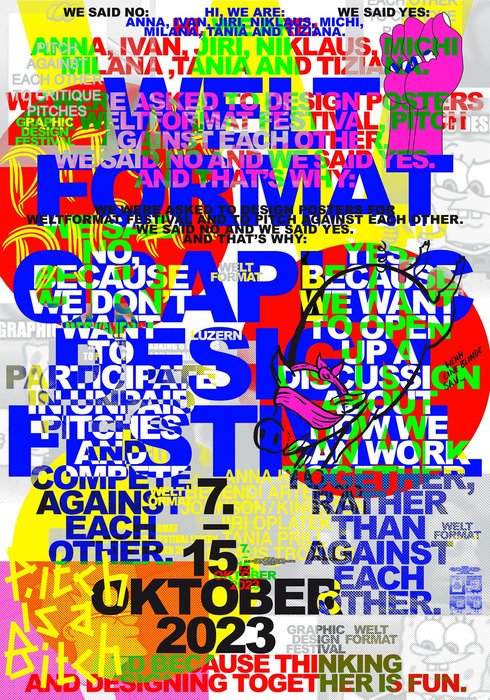 AwardTuesday | 26 March 2024
AwardTuesday | 26 March 2024„Life’s a pitch“
HfK professor Tania Prill and colleagues designed one of the "Best 100 Posters 2023"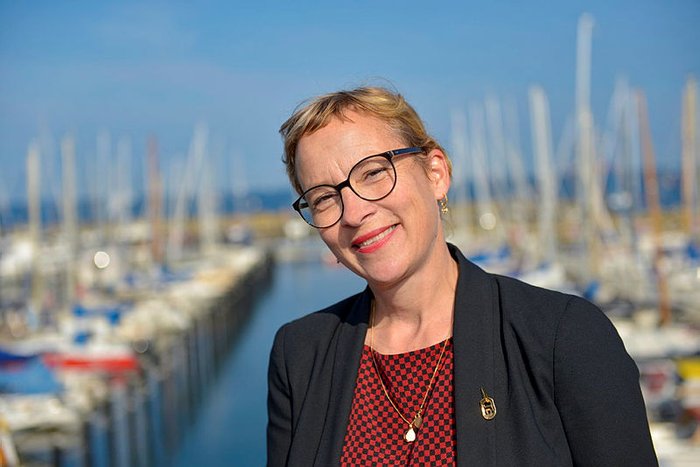 NewsMonday | 22 November 2021
NewsMonday | 22 November 2021Tania Prill gestaltet das Design für die Kieler Woche 2022
Energie, Vielfalt und Lebensfreude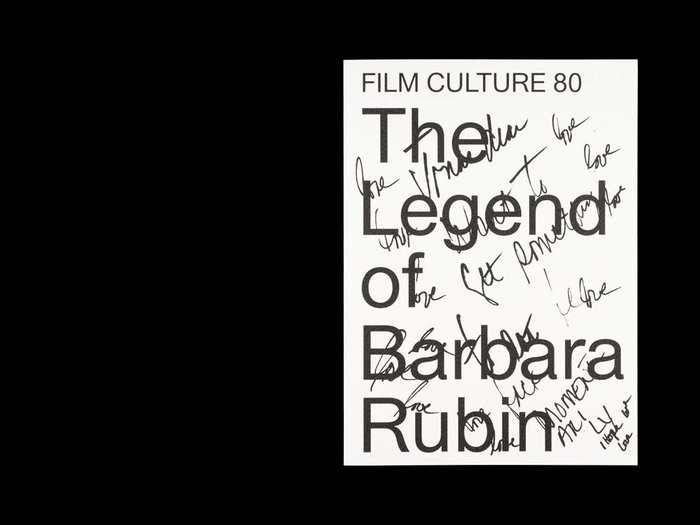 AwardTuesday | 9 April 2019
AwardTuesday | 9 April 2019Von Tania Prill und Franziska Bauer gestaltete Publikation ausgezeichnet
„The Legend of Barbara Rubin“ unter den 19 „Schönsten Schweizer Büchern“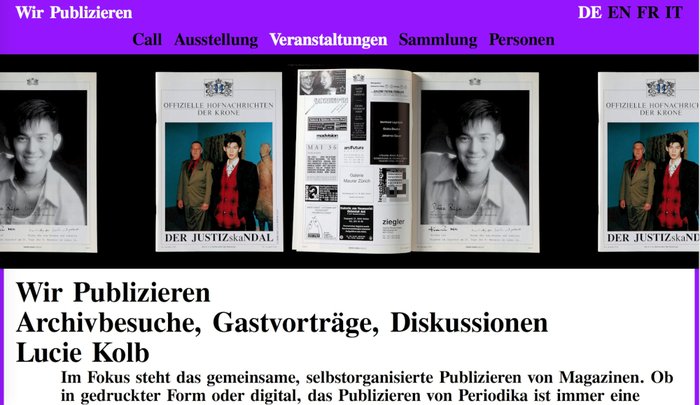 NewsWednesday | 6 February 2019
NewsWednesday | 6 February 2019„Wir publizieren“ – Master-Studio School of Visual Combinations
Projekt des Fachbereichs KuD der HfK mit der HKB zum Herausgeben, Vervielfältigen und Verteilen NewsTuesday | 16 October 2018
NewsTuesday | 16 October 2018Ein offener Brief von Gestalter*innen fordert die Stiftung Buchkunst zum Diskurs heraus
Zahlreiche Grafik-Professor*innen richten einen offenen Brief an die Stiftung Buchkunst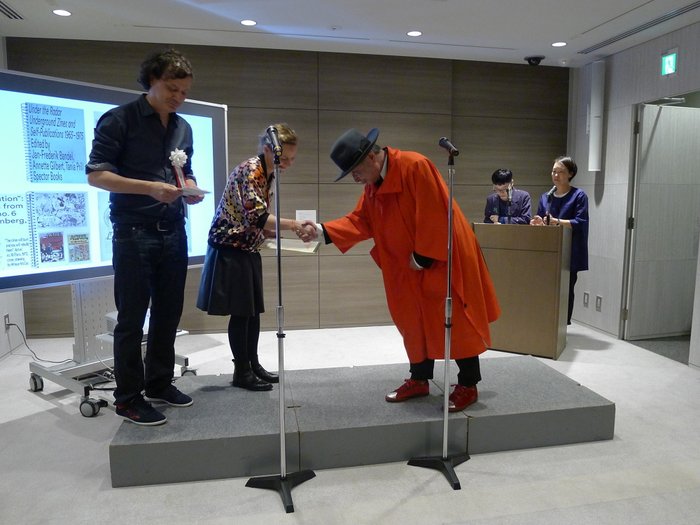 AwardFriday | 13 April 2018
AwardFriday | 13 April 2018Type Directors Club Tokyo zeichnet HfK-Publikation aus
„Unter dem Radar“ gewinnt Grand Prix in Tokyo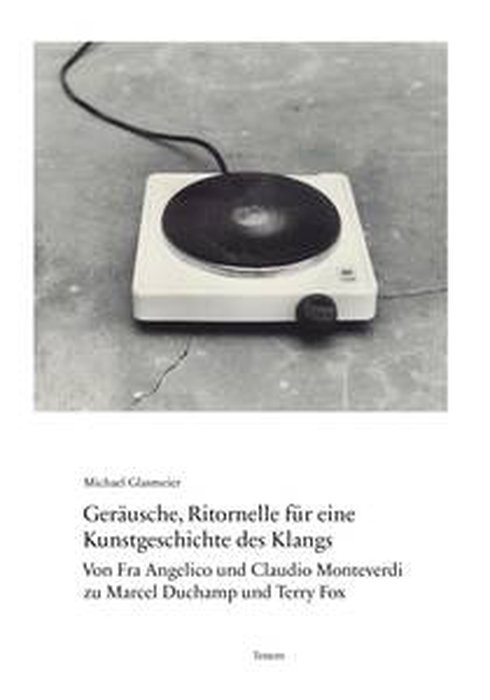 NewsWednesday | 4 April 2018
NewsWednesday | 4 April 2018Geräusche, Ritornelle für eine Kunstgeschichte des Klangs
Publikation, Juli 2016
